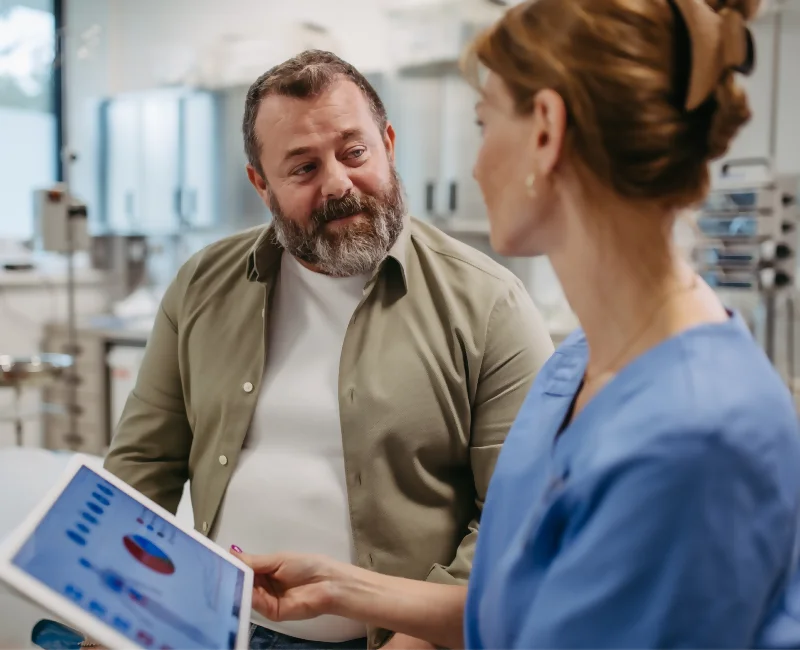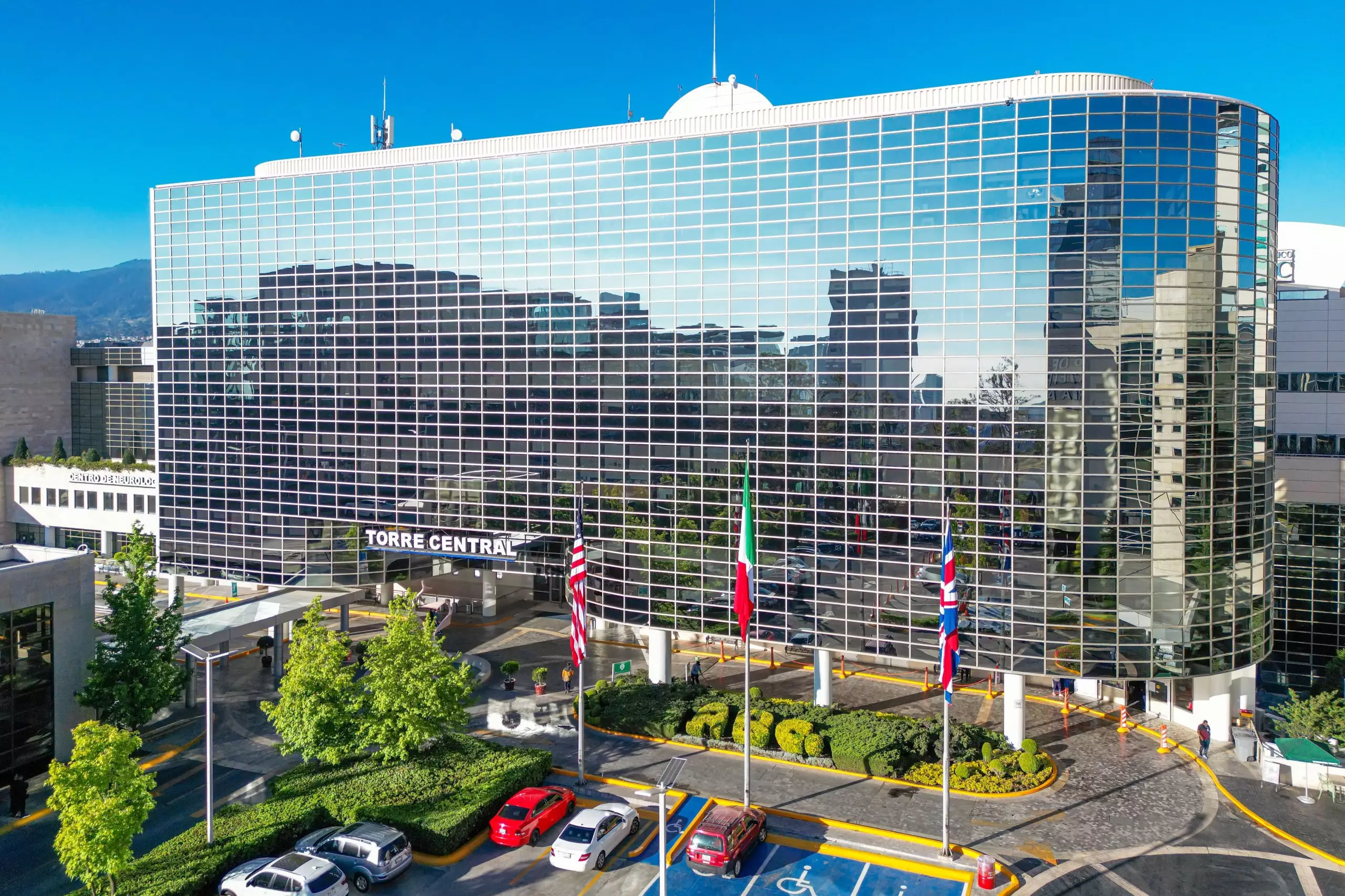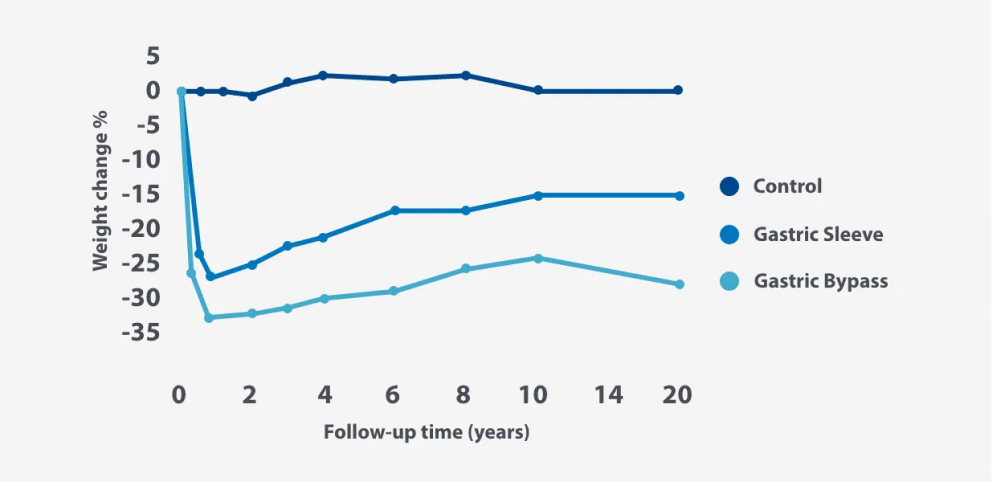Surgical Treatment of Obesity
Medical evidence shows that with weight loss induced by Bariatric Surgery, there is a significant improvement in diseases associated with Obesity.
In most patients, it is done laparoscopically, under general anesthesia, and its duration is rarely more than two hours.
Fewer Pounds = More Life!

Schedule an appointment for Gastric Bypass or Gastric Sleeve.

Comprehensive Care in Bariatric Surgery and Obesity Management
Candidates for bariatric surgery must be carefully selected and evaluated by a team of specialists in internal medicine, sports medicine, surgery, psychiatry or psychology, and nutrition. At the Nutrition and Obesity Center, we offer programs for accelerated and sustained weight loss under the supervision of a multidisciplinary team, based on safe and scientifically backed methods.
In addition to the Nutrition and Obesity Center and its multidisciplinary team, ABC Medical Center has highly trained bariatric surgeons who also work with a multidisciplinary team of healthcare professionals. Our experts provide a comprehensive approach to obesity management, from personalized nutritional counseling to advanced medical treatments.
This coordinated approach ensures that each patient receives the best possible care, tailored to their specific needs.
Benefits of Bariatric Surgery
Bariatric surgery is a tool that supports a comprehensive change in health and well-being, helping to improve quality of life in a progressive and sustainable way.
- Improves quality of life by promoting greater physical and emotional well-being.
- Contributes to weight loss in a faster and more sustainable manner.
- Helps prevent cardiovascular diseases.
- Reduces the risk of developing type 2 diabetes and other metabolic conditions.
- Improves overall health by reducing or even eliminating obesity-related conditions.
- Increases energy levels and the ability to perform daily activities, supporting a more active lifestyle.
- Improves mobility and reduces joint pain, facilitating movement and independence.
- Supports increased self-esteem and confidence, positively impacting personal and social life.
What is a bariatric surgeon?

A bariatric surgeon is a doctor specialized in performing surgical procedures to treat obesity and weight-related diseases. These professionals have specific training in gastrointestinal and bariatric surgery and are qualified to evaluate, recommend, and perform various surgical interventions aimed at helping patients lose weight effectively and sustainably.

Procedures performed by a bariatric surgeon
Bariatric surgeons perform a variety of procedures designed to reduce the capacity of the stomach and limit nutrient absorption. Some of the most common procedures include:
Gastric Bypass
Gastric Bypass involves dividing the stomach in such a way that food passes from the esophagus to a very small portion of the upper part of the stomach, called the gastric pouch. A connection is then made from the small intestine to the new stomach, so fewer calories are absorbed, promoting weight loss.
- Advantages: Rapid and sustained weight loss, significant improvement in comorbidities such as type 2 diabetes, hypertension, and sleep apnea.
- Disadvantages: More complex procedure, higher risk of nutritional deficiencies.
Gastric Sleeve
Gastric Sleeve involves converting the stomach into a tube or sleeve similar to the esophagus or intestine, altering its capacity and the production of hormones responsible for regulating appetite and satiety.
- Advantages: Less complex than gastric bypass, lower risk of nutritional deficiencies, significant weight loss.
- Disadvantages: Irreversible, possible gastroesophageal reflux issues.
Long-term Weight Behavior
Bariatric Surgery, combined with comprehensive post-surgical management and lifestyle changes, can offer long-term results for health and body weight.
State-of-the-art gastric balloon
Some specialists offer a continuous weight loss program for 6 to 12 months using an advanced gastric balloon that induces a feeling of fullness, helping to reduce food intake. The balloon is ingested in the X-ray room, and the procedure lasts 15 minutes, is outpatient, and is naturally eliminated in about 16 weeks. During this time, patients may experience an average weight loss of 10 to 15% of their total body weight.
- The balloon, folded in a capsule with a thin catheter, is swallowed with the help of the specialist and a glass of water. Then, an X-ray is performed to confirm its correct position.
- The balloon is filled with 550 ml of saline solution, and its filling is confirmed with a second X-ray. Once filled, the balloon reaches a size approximately equal to a grapefruit.
- The specialist carefully removes the catheter from the patient’s mouth. The placement ends here.
- Advantages: Non-surgical procedure, no need for endoscopy or anesthesia, temporary, less invasive.
- Disadvantages: In rare cases, the balloon may need to be removed via endoscopy, and a small number of patients may expel the empty balloon through vomiting at the end of the treatment. It is important to note that results can vary significantly between patients, and a small percentage may not respond to the treatment.
What is the best bariatric surgery procedure?
Determining the best bariatric surgery procedure depends on several individual factors, including the patient’s overall health, the degree of obesity, existing comorbidities, and personal preferences. There is no one-size-fits-all approach. Below are some considerations:

- Gastric Bypass: Recommended for patients with severe obesity and significant comorbidities such as type 2 diabetes.
- Gastric Sleeve: Ideal for those who prefer a less complex procedure with effective results.
- Gastric Balloon: A temporary option for patients who are not ready for permanent surgery or have a lower BMI.
At ABC Medical Center, our doctors are highly trained and certified, ensuring that patients receive the best possible care and the most advanced and safe procedures available.
Importance of Certification and Excellence at ABC Medical Center
When seeking a bariatric surgery specialist, it is essential to ensure that they are certified. Certification guarantees that the doctor has completed the necessary training and education, meeting the quality and safety standards set by medical authorities.
At ABC Medical Center, we have a team of highly qualified and certified bariatric surgeons in Mexico City, dedicated to providing personalized and effective weight loss solutions. Our specialists use the most advanced and safest techniques, working closely with nutritionists and psychologists to offer a comprehensive approach to obesity management.
Testimonials
Read the testimonials of Ana Saad and Ximena Salomón, where they talk about their transformation and how they overcame obesity with bariatric surgery for weight loss.
Support Group “Vive Ligero”
It is important for the long-term success of your treatment, recovery, and follow-up. Remember that obesity is a chronic disease, and the group helps you stay aware of your condition.
It meets online twice a month, and sessions are open to your family and friends if you wish. If you are interested in obesity surgery, we recommend that you attend at least one session before the procedure.

Frequently Asked Questions
Bariatricians near me...
At the Nutrition and Obesity Center we offer you comprehensive care according to your needs to help you have a healthy lifestyle, control your weight, prevent and manage associated diseases. Visit us!

Campus Observatorio
Sur 136 No. 116, Col. Las Américas, Álvaro Obregón, 01120, Cd. de México.

Campus Santa Fe
Av. Carlos Graef Fernández 154, Col. Santa Fe, Cuajimalpa, 05300, Cd. de México.



